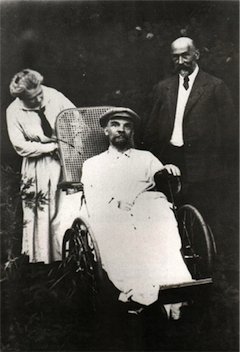

|
Lenin's Testament  The last photograph of Lenin Between 23 December and 4 January Lenin dictated a series of fragmentary notes for the forthcoming Twelfth Party Congress which became known as his Testament. Lenin ordered them to be kept secret but his secretaries showed them to Stalin. Throughout these writings there is a sense of anxiety and perhaps despair at the way the revolution had turned out. Lenin's last notes were concerned with three main problems - with Stalin in each as the principal culprit. The first of these was the Georgian affair, the nationalities question and what sort of union treaty should be signed. Once the Red Army had reconquered Russia's old imperial borderlands in Ukraine, Central Asia and the Caucasus, Stalin, as the Commissar of Nationalities, proposed that the non-Russian republics should join Russia as autonomous regions, effectively depriving them of the right to secede from the union, which Lenin wanted them to have as sovereign republics. Stalin's plans were bitterly opposed by the Georgian Bolsheviks. The entire Central Committee of the Georgian Communist Party resigned in protest. Lenin was outraged when he learned that in an argument Sergo Ordzhonikidze, the head of Moscow's Caucasian Bureau and Stalin's close ally, had beaten up a Georgian Bolshevik. It made him see Stalin and the Georgian issue in a different light. Lenin's second concern was to check the powers of the party's leading organs. He proposed to democratize the Central Committee by adding 50 to 100 new members from the lower party organs; and to make the Politburo more accountable to the Central Committee. The final issue - and the most explosive - was the question of the succession. To underline his preference for a collective leadership, Lenin pointed out the faults of all the party leaders: Kamenev and Zinoviev were compromised by the stand against him in October 1917; Bukharin was the 'favourite of the whole party but his theoretical views could only be classified as Marxist with reserve'. Trotsky was 'perhaps the most capable man in the Central Committee' but 'displayed excessive self-assurance'. Yet it was for Stalin that Lenin's most devastating criticisms were reserved: Stalin is too rude and this defect, although quite tolerable in...dealings between Communists, becomes intolerable in a General Secretary. For this reason I suggest that the comrades think about a way to remove Stalin from the post. Lenin's resolve was strengthened on 5 March, when he learned about an incident which had been kept from him: Stalin had subjected 'to a storm of coarse abuse' for communicating his congratulations to Trotsky after a debating victory against the triumvirate. Lenin was devastated by the incident. He became ill overnight. Three days later he suffered his third major stroke. It robbed him of speech. Until his death, ten months later, he could only utter single syllables. |
© 2014 Orlando Figes | All Rights Reserved